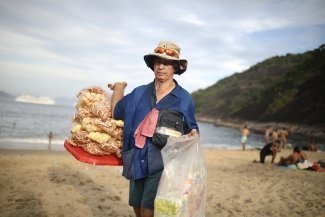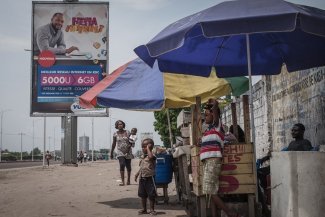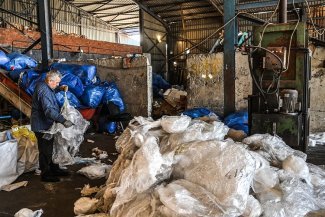Textbooks in tens of thousands of Thai schools present a very narrow view of gender roles. Women, in theory, should “wear skirts, be mild-mannered, look after their appearance, and take an interest in cooking, housework, knitting and flower arranging”. Men, for their part, “should wear trousers and do sports”. Photo from 2017 of Thai schoolchildren.
Suphanut is 18 years old and has been bullied since primary school. His classmates often call him gay, because he is not very “manly” and he does not like to play football. On one occasion, he was told that he “should never have been born” if he wanted to be gay, even though he is not, in fact, attracted to boys.
The young man thinks that the problem lies, to a large extent, with their textbooks. Sex education in Thai classrooms is approached from a biological perspective, with very little emphasis on sexual health or wellbeing. Homosexuality is described as an illness or abnormality, and students are encouraged to stay away from LGBTI (lesbian, gay, bisexual, transgender and intersex) “sexual deviants” at school.
One of the books for eighth grade pupils advises that parents should “take LGBT children to psychiatrists” and that pupils should “know and act in accordance with appropriate and normal gender roles”. Cheera Thongkrajai, an official from the Ministry of Social Development and Human Security (MDHS), says the books were approved by a committee within the Ministry of Education and are used in about 30,000 secondary schools, both public and private.
The texts present a very narrow view of gender roles. Women, in theory, should “wear skirts, be mild-mannered, look after their appearance, and take an interest in cooking, housework, knitting and flower arranging”. Men, for their part, “should wear trousers and do sports”.
In October 2018, a group of activists advocating change, including Suphanut, called on the government to review these books. The public official Cheera Thongkrajai explains that the Education Ministry has responded to the complaint by setting up a national working group with NGOs, but the date on which the results of the process will be made public is not yet known.
This Asian country is considered, internationally, to be an “oasis” for LGBTI people but, in practice, they are not socially accepted. Legislation recognising same-sex civil partnerships, for example, although still to be passed by parliament, was approved by the government at the end of December 2018. Once passed into law, Thailand will be the first Asian country to adopt such a measure.
Transgender people are very visible in Thai society but life is nonetheless difficult for them, as even after undergoing full gender reassignment surgery, they cannot change their name or sex on paper.
The inability to change their identity means that trans people are exposed to all manner of problems and abuses for the rest of their lives, whether it be when applying for a job, opening a bank account or applying for a visa to travel abroad, because their appearance does not coincide with the gender on their documents.
A national study by the United Nations Development Programme (UNDP), which is pending publication and to which Equal Times had access, shows that the general public in Thailand is more accepting of transgender people outside of their family than those closely related to them, especially in rural areas.
“Open to discrimination and violence”
Content similar to that found in Thai textbooks also exists in other countries in the region, such as Indonesia. Women are considered to be subordinate in this society, which has a long patriarchal tradition, and the LGBTI community has to grapple with hatred on a daily basis.
According to Nina Nurmila, a national commissioner for violence against women in Indonesia, general textbooks “still contain gender-biased images or statements that tend to domesticate women and place men in the public sphere”.
The Indonesian government recently made critical appraisals of these texts, but Nurmila points out that most Indonesians view LGBTI people as deviant, which leaves them “open to discrimination and violence”.
In recent years, many women in Indonesia have left behind what is considered to be the “natural division of labour”. The commissioner explains that this has “created tension and conflict” in cases where a husband cannot fulfil the responsibility of providing for the family (which has traditionally been his role), or when men “continue to expect their wives to serve their daily meals, wash their clothes and provide sex whilst they provide no help with household chores and child raising”.
Nurmila explains that, traditionally, although some wives earn a living outside the home, they continue to ask their husbands for money because it is stipulated that when a woman works, the money is for herself and not to support the family.
But there are also cases where the woman supports the household at the same time as taking care of the domestic chores and the children, while the husband does nothing for the family. The cumulation of tensions created by this new social reality is already leading to a rise in the number of divorces.
Malaysia has also revisited its schoolbooks, which warn girls not to bring shame on themselves and their families by having sexual relations, to wear clothes that “protect the modesty of their genitals”, to change clothes behind closed doors and to avoid quiet places when on their own.
In January of this year, deputy education minister, Teo Nie Ching, called for an immediate review after a photograph of one of the pages (which, among other infographics and texts, warns that a family’s honour rests on a girl’s shoulders) went viral on Twitter.
Gender bias in school textbooks is not limited to south-east Asia. Women are portrayed as subordinate in all continents. In Tanzania and Turkey, for example, strong working boys are presented in various occupational settings, while girls are depicted in bridal gowns or doing household chores.
The good news, according to UNESCO, is that equality content is improving with time, although gender bias in textbooks remains a hidden obstacle on the road to equality in education. In Vietnam, for instance, the government has recognised that inequality is one of the barriers to the eradication of poverty, and textbook publishers pledged to eliminate gender stereotypes and to promote equality after being criticised for using content that perpetuates discrimination in the classroom.
Young Suphanut does not think rapid change will come easily in Thailand, but sees his complaint as a first step towards ending the reproduction of the same ideas within society or, more specifically, in the classrooms where he has faced so much discrimination.










